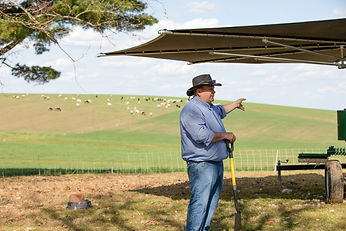

"Take the next right step."
-Monte Bottens
Bottens Family Farm is a multigenerational 2,000-acre farm located in Cambridge, Illinois, and has been in the family since 1869. Like all operations, this farm has seen its fair share of change over time, but fast forward 150 years, and Bottens Family Farm is farming more and more like the first generation than ever before. Their goal is to regenerate their soil by bringing diversity back to the land through livestock and cover crops and one day maybe vegetable and tree crops. The farm team’s daily challenges are finding ways to use technology to improve, reduce or remove outdated farming practices and create the very best living environment for the crops and livestock in their care.
The farm returned to a focus on stewarding the land when father and son team, Bob and Monte, implemented no-till methods in 1995. In 2016, they began intensive cover cropping and integrating livestock to improve soil health. In early 2018, Monte and his wife, Robyn, started a marketing platform called Grateful Graze to take their grass-fed proteins direct to consumer. The farm now raises cattle, pigs, and poultry on 150-acres of diverse pasture on-site and nearby acreage.
The livestock became a "crop rotation" on crop ground. Bottens Family Farm still grows corn and soybeans but added wheat, cover crop mixes and grazing livestock to what was once a monocrop system. Having spent the last 50 years removing fences and old structures from the farm, the team is now challenged with finding ways to graze and contain the livestock. Today, the livestock move daily which requires solar panels, battery power, portable pumps, electric fencing, virtual fencing and guardian dogs to keep the livestock protected, watered and fed. Any buildings or structures are also portable so they can move with the animals.
As each soil health principle went into action and continued overtime, the farm team sees the improvements happening in the soil which affirms they are on the right path using regenerative farming practices. In doing so, Bottens Family Farm gained ground from landowners approaching Monte and asking for soil health to be put into practice on their acreage. Now the farm team manages conventional, regenerative, and everything in between.
From no-till, to cover cropping, intercropping, and relay cropping, Bottens Family Farm uses a systems based approach and makes minor and major adjustments each growing season based on what they’ve learned from replicated trials over time. Regenerative agriculture is not for the faint of heart, but diversifying crops and adding livestock back to the land has led to their current model of stacked enterprises which has gained them a renewed connection to the community with new opportunities and revenue streams.

